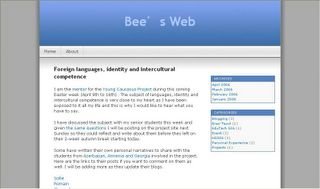Start sharing your ideas!
Read what other foreign students think about this issue, "Foreign languages, identity and intercultural competence". Bilingualism is an issue that we covered in class. On our discussion forum many of you have admitted having a public and private language- a question that Bee asked her students to think about. We also touched on 'identity' and how language affects the way we view ourselves and how we look at others. There is power in language- just as Barbara Mellix expressed in her article. However, that power is associated with being proficient in a language, being confident with it and using it to gain a certain status in society. This is what makes it a bit difficult for EFL (English as a foreign language) students. High level of proficiency is not easy to attain. It takes a lot of practice, a lot of effort, and sometimes it may even take a lifetime. But having gone through with all the hardships in learning English, you have all come a long way.Let's take a look at what some of Bee's students have to say:
From Amanda
In my country, English is the first language people use to communicate with foreigners. English is widely spoken in much of the world. I really don' t think that just by learning a different language we change our identity, but we assimilate the languages and they become part of our identity. We can maintain our own customs and way of life, and at the same time speak many languages. In my case, I continue to live as a Brazilian. However, I have adopted certain French customs as my own - but this didn’t' t change who I am.
Finally, learning different languages is very important and also needed at this time of our lives as learning another language can help you to understand your own.
Tell Amanda what you think, visit her blog and click on 'Comments' to leave her a message.
See what other students have to say. Here's a link to Bee's students' individual blogs.





1 Comments:
Great read thank yyou
Post a Comment
<< Home